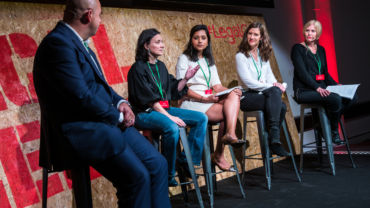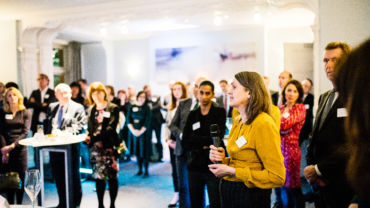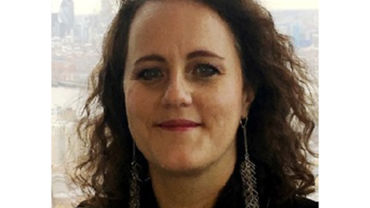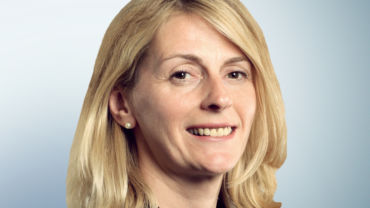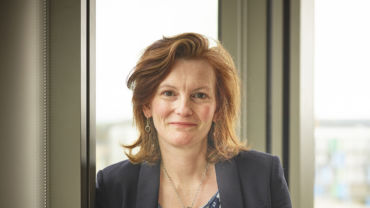Julia Hayhoe, Chief Strategy Officer at Baker McKenzie, is passionate about building and shaping legal businesses alongside diverse teams of very bright and driven individuals.
As a member of Thomson Reuters’ Transforming Women’s Leadership in the Law (TWLL) programme Advisory Board, Hayhoe believes it is crucial that it includes people with a diversity of perspective, from a variety of legal and commercial backgrounds and roles in the legal industry. This is because she believes that the legal organisations of the future will look very different to those of today. Therefore, shaping the future of the legal industry requires multidisciplinary skill sets and in turn offers many different and exciting new career paths across the legal industry.
How did it all start for you, and when did you first become interested in the law?
If I go back to considering degrees for university, I had fairly rudimentary career guidance from my comprehensive school, which was just pointing me towards some university prospectuses saying ‘have a think’. Nobody in my family had been to university before, so it was all extremely new to me. I had a flick through the university prospectuses and I found what I thought was a really interesting degree; Philosophy, Politics and Economics. I thought it sounded brilliant, so I talked to my teacher at the time, and he said ‘oh no not that one, it’s an Oxbridge course, and that’s not really what we do, or for you, so look for something else’. So, feeling embarrassed, I looked at the prospectus again and thought that Law struck an interesting note around justice and being able to make a difference in society. And yes, that was the last time I didn’t trust my instinct and listened to someone tell me what I was capable of doing, or not going to do, or what was available to me! Those seeds of interest didn’t go away. I’ve always had a wider macro interest in business and the world, which later on likely propelled me to do an MBA and morph from law, via consulting, into the business of law and strategy.
Have your aspirations changed throughout your career?
I would say my aspirations have evolved. My career is quite unusual in that I did do a Law degree and I practiced law for a couple of years and spent time on secondment in-house, then I moved fairly quickly into the business side of law. This was after I was awarded a scholarship with The Guardian newspaper, that paid my fees to do an MBA and it was quite a big leap into the unknown. I was very happy as a junior lawyer with the firm I was with at the time, but I was a little restless and talking to a friend who ran his own business about what you need to do to progress career-wise. He suggested an MBA would be useful both from the wider business skills and also to diversify my experience. Something in me just said, ‘this is going to be really interesting,’ and it did really open my eyes to the business side of the law. After that, I spent time at Clifford Chance on an internal consulting role, and then moved to Hildebrandt, a niche strategy and management consultancy that focused on in-house and private practice law firms.
The move from law to business was what really tapped into my real interest in the building of businesses rather than the practice of law. The combination of being able to shape and build a business in a culture consisting of very bright, driven people with strong views about how to build that business, is very challenging and hugely fulfilling at the same time. I’m told one of my strengths is making connections, creating consensus and bringing people together to achieve a bigger goal, which for me has played into the business of law much more than the practice of law.
What influences have impacted your career path?
When I came back to the UK from working in the US, I had been consulting for eight or nine years, so it was a natural time to move and shift my career path to an in-house role, as I did to Baker McKenzie. When you have been a consultant for that long, you get to a point where you really want to see projects through, not just run them for six-12 months.
On a personal front, the return from the US coincided with having my son and so I welcomed not having to travel back and forth to the US every six weeks as a consultant. Having said that, I knew I would always have an international flavour to my role as I find different cultures and places fascinating. I think the travel element is just a norm for me as my Dad’s career meant he travelled a lot and we did so as a family. It was not surprising that I would go on to have a strong career with lots of travel, as I do now with Baker and that between us, as a family, we would work out how we juggle things. And actually, there are huge benefits, especially when you can plan your trips as I can do so now, because the Executive Committee meetings are set a year in advance. My husband is very supportive and loves traveling in his own right. So my son now gets to see the world and different cultures when we can coincide with school holidays and use air miles.
Read about Thomson Reuters’ Transforming Women’s Leadership in the Law programme
What do you think are the triggers around the increasing awareness of the need to address gender diversity issues?
I think we have really hit this tipping point when you look more widely at society and business and the greater levels of awareness of gender inequality. In terms of triggers, there are a few. We now have more women in senior leadership positions, which change the dynamics and norms at the top, for the benefit of the wider business and support each other. The work, for example, of the ‘30 percent club’ has been tremendous in encouraging business to appoint more women to the Board and at Bakers we have worked with the legal section of the ‘30 percent club.’ There are also a lot of vocal male allies making a difference, for example through the ‘He For She’ programme. We have better data and more transparency of data now too, which shines a light on the issues and also provides the strong evidence based business case for diversity being critical to business performance. The McKinsey studies have been instrumental here. The buyers of legal services also have better data now to set out their own diversity and inclusion expectations and inform their choices on the appointment of firms to their panels. Finally, I think the demographics are changing; you have younger generations, of all genders, coming through to more influential positions and for them it’s just not normal or acceptable to not have equality. There is a new systemic norm forming for the better.
What are the key things law firms are doing well to turn the dial on gender diversity?
First of all, organisations be it in-house, private practice, or the Law Society, are looking much more systemically and holistically at the issues around turning the dial on gender equality. It’s not just ad hoc initiatives, there are strategies that are holistic programs that combine talent pipeline, sponsorship, unconscious bias, agile working, which work synergistically together. Secondly, there is a lot more engagement now with champions and allies, across the diversity streams, whether it’s LGBT+, or ethnicity, or gender. There is a much greater awareness and engagement with people outside of that minority, so it’s not just the minority trying to advocate for change. And the third thing, I think organisations and individuals are prepared to come out of their comfort zones more and challenge the status quo personally. It’s one thing to have the right holistic programmes in place, but it’s another to get allies and champions as part of the solution.
But ultimately, I think what it takes is for cultures to change. There is an interesting initiative that we have started at Bakers that is really making a mind-set and cultural difference. It is also helping to address the challenges at the intersection of ethnicity and gender. It’s a complicated and nuanced issue, but one way we are trying to tackle it is through our ‘Colour Brave’ campaign. Research has shown that people are very uncomfortable talking about ethnicity in the workplace, and that creates a barrier, because if you can’t talk about it and raise awareness, how can you solve things? I think it is a good example of organisations and people coming out of their comfort zones and challenge issues where there is no obvious or easy answer, but we have to discuss and make progress. On this, I recommend the recently published and superb book – British(ish) – by the author Afua Hirsch.
Do you have any women you have met in your career/other parts of life that inspire you? And do you have advice that you could share with fellow women in law looking to advance their career?
When I was a management consultant, and I was going for partnership, there was a senior women partner in the business and I realise looking back now that what she was doing was sponsoring me. What we now know in ‘sponsorship program’ terms. She was intentionally putting me forward to work with high profile clients, putting me forward to lead roles and promoting me within the business. At the time it felt like an awful lot of stretch—more out of my comfort zone than in. But I realise now that it gave me the access that enabled me to shine. Having been beneficiary of that, I take responsibility now to advocate for people rather than being passive, so I try to pass that on, in a very dedicated way, to a number of female colleagues and importantly other minorities.
In terms of career advice, when you sit on a Board, you realise how important somebody’s profile is and how important it is for career progression to be known by a range of more senior people. I learnt this lesson the hard way. Whilst I benefited from the sponsorship of that senior women partner, it lead me to think as I was coming up for partnership that, ‘great I am working really hard, getting great results and I have an ally on my side, so I stand a strong chance.’ But the first time round I didn’t make partnership and I was absolutely gutted. Instead a man with, in my eyes, lesser client credentials and ability than I had was the one promoted. Upon reflection, I realise that he was much better connected with a range of senior people in the main part of the business and I was a bit on the outside and had relied on only one champion.
I do see this happen, both for men and women and the lesson is not to overly rely on one champion. You need at least three or four people to be aware of your capabilities and achievements. You also need to be looking up one extra level. So, when you’re seeking a promotion, it’s not just your boss, but your boss’s boss that needs to be hearing about you, that you are doing brilliant things and making a really big difference. This brings us full circle back to the important role of sponsorship.
Why did you become an Advisory Board member for the TWLL programme?
It’s about being able to make a difference. It’s really clear that the magnitude of change needed, requires – as the old saying goes – a village. This initiative is made up of a great eco-system of private practice, in-house and regulatory and it’s going to take a group of people to make a meaningful difference. It is also a very supportive group of really inspiring women, that inspire you in turn to go to even greater lengths − so you are making a difference being part of a team and you are inspired to go further.
What most excites you about the TWLL programme?
You accumulate a lot of experience through the years, so I look forward to sharing my lessons learned. Some of them have been quite painful lessons, but I’ve learned if you lose don’t lose the lesson. If I can help anybody else by sharing my experiences, hopefully they are relevant and can be used in one form or another. Also, I’m looking forward to hearing from the next generation coming through, because I think a part of our initiative’s ‘raison d’etre’ is really to be informed by the next generation and not just go with the status quo.
Another aspect that excites me is the blend of legal and business skills on the Advisory Board. For someone that comes into law thinking about their career path, the legal organisation of the future is going to look very different to the traditional private practice firms of today, so there are many different career paths across the legal business dichotomy. So helping people realise that it’s not a single or linear track, it can evolve, it can be a blend of law and business, and when you start putting in innovation and technology, there is a whole raft of different skills and competencies that need to be built. So I am interested in showcasing and helping people see the wider career alternatives in law.
Finally, I would also like to do more to advance social mobility in the legal industry, particularly at the intersection of gender and ethnicity. Having access and awareness is so important early in school and your career, so I hope we can make an impact here as well, so a wider range of people are aware of these fantastic career options in the legal industry.


